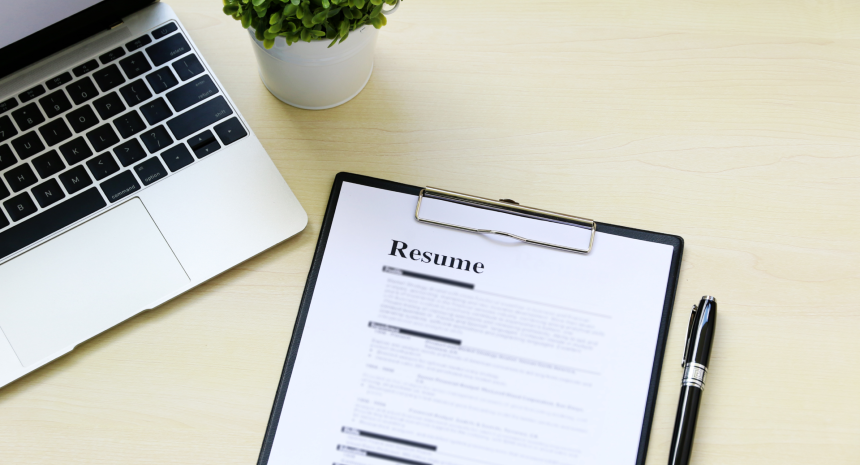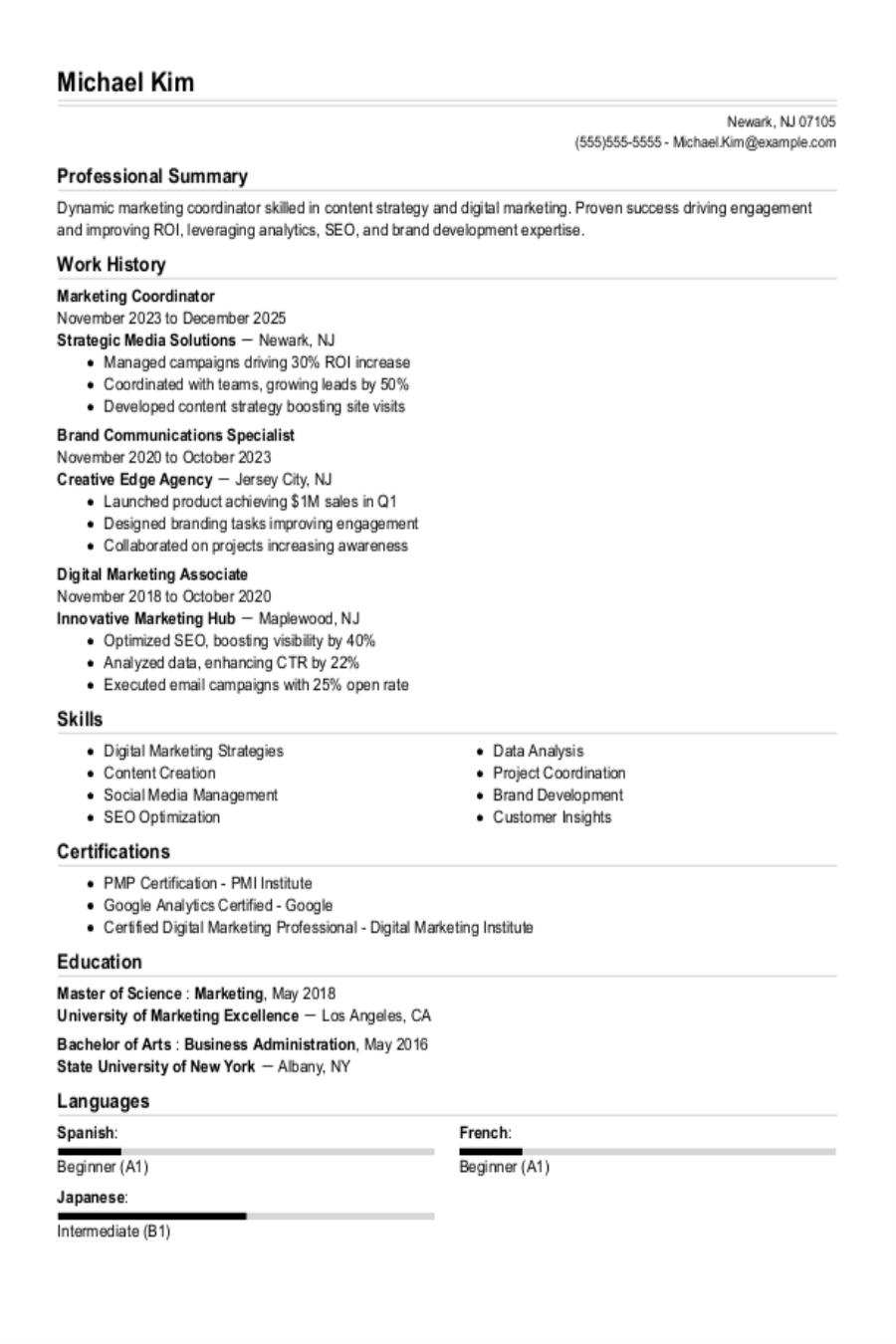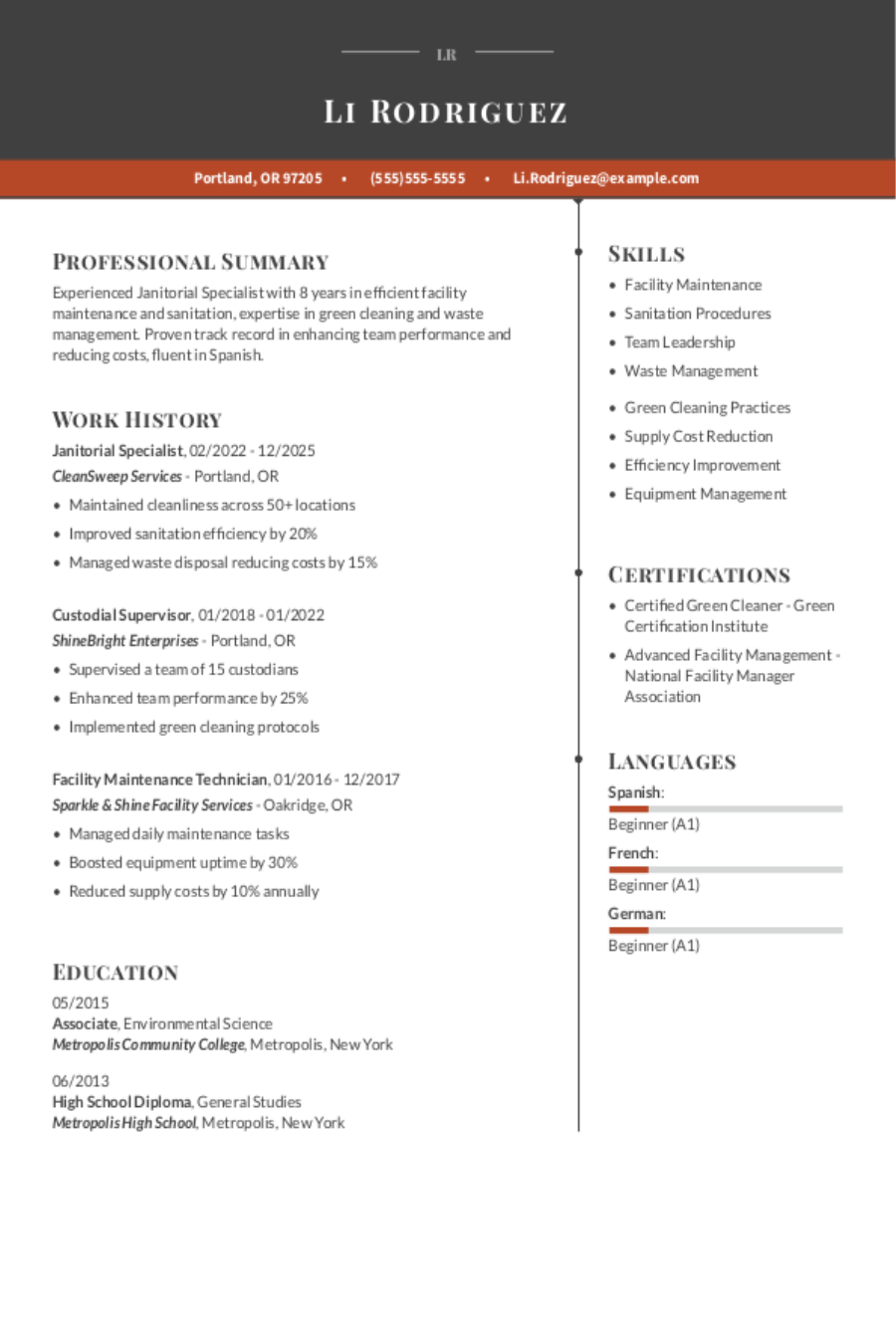Popular Front Desk Receptionist Resume Examples
Entry-level front desk receptionist resume
An entry-level resume for a front desk receptionist should focus on customer service skills, communication abilities, relevant coursework, and any volunteer experience to highlight readiness for the role despite limited work history.
Focuses on goals: The job seeker demonstrates a proactive approach to professional development, excelling in customer service roles and improving patient satisfaction while efficiently managing front office operations.
Emphasizes soft skills: This resume highlights the job seeker's exceptional soft skills, such as communication and organizational abilities. Transferable skills like these help employers understand your potential to contribute, even with limited experience.
Mid-career front desk receptionist resume
A mid-career front desk receptionist resume should emphasize a combination of customer service experience, communication skills, and personal growth to demonstrate readiness for increased responsibilities in a dynamic work environment.
Powerful professional summary: An effective professional summary allows recruiters and ATS to swiftly pinpoint key qualifications. Highlighting experience in optimizing operations and improving client satisfaction showcases relevant skills that stand out in a competitive job market.
Emphasis on experience and skills: This job seeker’s resume effectively showcases their technical skills in customer service and organizational efficiency while highlighting a clear trajectory of career advancement from administrative roles to a front desk receptionist position.
Experienced front desk receptionist resume
An experienced front desk receptionist resume should prioritize highlighting key achievements in customer service, organizational skills, and professional development to effectively illustrate the applicant's growth and contributions in the role.
Quantifies achievements: Quantifiable achievements provide a clear picture of a job seeker's impact, making it easier for recruiters to grasp the significance of their contributions. By highlighting specific numbers, such as "greeted 50+ guests daily" or "reduced errors by 20%," applicants effectively demonstrate their value and capability in previous roles.
Embraces a modern style: This modern resume template showcases the applicant’s commitment to delivering exceptional guest experiences, reflecting an innovative approach that improves operational efficiency and fosters strong relationships in the hospitality industry.
No experience front desk receptionist resume
A resume for an applicant with no experience should highlight relevant skills, volunteer work, and any customer service-related activities to showcase their ability to succeed in a fast-paced, client-focused environment.
Uses straightforward language: Job seekers often feel pressured to embellish their resumes with complex terms or inflated descriptions of simple tasks, but this is a mistake. A straightforward approach is much more effective, showcasing genuine skills and experiences that employers can understand at a glance.
Emphasizes professional skills: Emphasizing strong communication and organizational skills demonstrates the applicant's readiness for the front desk receptionist role, effectively compensating for limited hands-on experience in a professional setting.
More resume examples
Additional Guides
Front Desk Receptionist Resume Template
Kickstart your career with this versatile front desk receptionist template. Simply adapt it to reflect your unique experience and skills for a standout application.
Michael Martinez
Eastside, WA 98009
(555)555-5555
Michael.Martinez@example.com
Professional Summary
Experienced Front Desk Receptionist with 8 years of customer service accomplishments. Skilled in handling reservations, managing guest inquiries, and boosting satisfaction ratings. Proficient in communication and problem solving, with a proven track record in administrative support.
Work History
Front Desk Receptionist
Pleasant Stay Hotel - Eastside, WA
June 2022 - August 2025
- Managed 50+ daily check-ins/check-outs.
- Handled guest inquiries, boosting satisfaction by 15%.
- Coordinated reservations, increasing booking rate by 20%.
Customer Service Representative
City Bank - Tacoma, WA
May 2018 - May 2022
- Resolved customer issues, reducing complaints by 30%.
- Assisted customers, enhancing loyalty by 20%.
- Processed transactions totaling 0k daily.
Administrative Assistant
Greenwood Consulting - Tacoma, WA
May 2015 - April 2018
- Scheduled appointments, saving 10 hours weekly.
- Updated client records, increasing accuracy by 25%.
- Organized meetings, enhancing office efficiency.
Languages
- Spanish - Beginner (A1)
- French - Intermediate (B1)
- German - Beginner (A1)
Skills
- Customer Service
- Communication
- Problem Solving
- Time Management
- Multitasking
- Reservation Management
- Microsoft Office
- Data Entry
Certifications
- CPR Certification - American Red Cross
- Certified Guest Service Professional - American Hotel & Lodging Educational Institute
Education
Master's Business Administration
University of California Berkeley, California
May 2014
Bachelor's Marketing
State University Los Angeles, California
May 2012
Writing Your Front Desk Receptionist Resume
Having explored these impressive resume examples, you're now prepared to embark on your own resume creation journey. We'll lead you through the process step by step, ensuring each section is thoroughly covered, so you can master how to write a resume with confidence.
List your most relevant skills
An effective skills section on your front desk receptionist resume is important for showcasing your suitability for the position. You should balance technical skills and interpersonal abilities while incorporating relevant keywords from the job listing.
By using keywords from the job listing, you not only demonstrate your alignment with what employers are seeking but also improve your chances of passing through applicant tracking systems (ATS). This approach ensures that human recruiters immediately recognize your qualifications while also meeting ATS criteria.
Example of skills on a front desk receptionist resume
- Proficient in managing multi-line phone systems and greeting visitors with professionalism
- Adept at scheduling appointments and maintaining organized front office operations
- Strong communicator with excellent interpersonal skills for customer service
- Detail-oriented with a commitment to accuracy in record-keeping and paperwork
Highlighting your soft skills on your resume can set you apart from other applicants. Employers greatly value interpersonal abilities, as they are often challenging to develop; showcasing these traits demonstrates your potential to contribute positively to the workplace environment.
Highlight your work history
Your work experience section should demonstrate what you've accomplished in previous positions, using specific examples that illustrate your capabilities in managing communication, multitasking, and providing excellent customer service.
For each job entry, make sure to include essential information such as your job title, the name of the employer, and the dates you were employed. This information helps potential employers gauge your experience level and understand the context of your past roles.
Example of a front desk receptionist work experience entry
- Front Desk Receptionist
Sunrise Medical Center - Los Angeles, CA
March 2021 - Present - Greet and assist an average of 100 patients daily, ensuring a warm and welcoming atmosphere that improves patient satisfaction.
- Manage appointment scheduling and check-in processes using electronic health record systems, improving efficiency by 30%.
- Handle patient inquiries and concerns with empathy and professionalism, contributing to a 95% positive feedback rate in patient surveys.
- Collaborate with medical staff to streamline communication between departments, ensuring timely patient care and reducing wait times by 15%.
- Train new receptionists on office protocols and software usage, improving team performance and reducing onboarding time by 25%.
Aim for clarity and impact in your resume bullet points. Each point should succinctly highlight a key achievement or responsibility, ideally in one concise sentence, ensuring that it conveys value without unnecessary elaboration.
Include your education
The education section of your front desk receptionist resume should highlight your academic credentials in reverse-chronological order, starting with your most recent degree or diploma. You may exclude your high school diploma if you've pursued higher education.
For those currently enrolled in a program or who have not completed their education, it's important to list the highest level achieved along with the expected graduation date. Additionally, including a few bullet points that emphasize applicable coursework or significant academic accomplishments can be beneficial for individuals who are still students or recent graduates.
Common certifications for a front desk receptionist resume
- Certified Front Desk Receptionist (CFDR) – National Association of Professional Receptionists (NAPR)
- Professional Receptionist Certification (PRC) – American Society of Administrative Professionals (ASAP)
- Medical Office Receptionist Certification (MORC) – National Health Career Association (NHA)
- Customer Service Certification (CSC) – International Customer Service Association (ICSA)
Sum up your resume with an introduction
Your resume profile is your chance to make a memorable first impression on potential employers. It serves as the gateway to your qualifications and can set the tone for the rest of your application.
For seasoned applicants, employing a professional summary allows you to highlight your experience and achievements. For beginner candidates, a resume objective allows you to highlight your career development and future goals.
Professional summary example
Dynamic front desk receptionist with over 5 years of experience in delivering exceptional customer service in a high-volume environment. Recognized for efficiently managing multi-line phone systems, coordinating appointments, and maintaining office organization to improve operational flow. Proficient in conflict resolution and data management, ensuring a welcoming atmosphere that fosters positive interactions and client satisfaction.
Resume objective example
Enthusiastic front desk receptionist eager to use strong communication, multitasking, and customer service skills to improve the visitor experience at a dynamic organization. Committed to creating a welcoming environment while efficiently managing appointments and inquiries to support overall office operations and contribute to team success.
As a front desk receptionist, it's essential to start your resume profile with your job title. This immediate introduction helps employers quickly recognize your professional identity, whether you craft a professional summary or an objective statement, making it clear who you are and what you bring to the role.
Add unique sections to set you apart
Including optional resume sections can elevate your application for front desk receptionist positions by highlighting unique qualifications that set you apart. These sections provide a platform to showcase your diverse experiences beyond standard job duties.
By incorporating relevant hobbies or volunteer work into your resume, you give potential employers insight into your personal values and skills. If you volunteer at a local community center, list them on your resume to illustrate your commitment to service and teamwork.
Three sections perfect for a front desk receptionist resume
- Languages: As a front desk receptionist, effective communication is essential. If you are fluent in multiple languages, highlight these language skills on your resume to improve customer interactions and service for diverse clientele.
- Volunteer Work: Including volunteer work on a resume not only showcases your dedication to community service but also highlights valuable skills that employers appreciate. It demonstrates your commitment and ability to work well with others, making you a more attractive job seeker.
- Achievements: As a front desk receptionist, your quantifiable accomplishments highlight your efficiency and impact on customer satisfaction. You could mention handling 50 calls daily or improving appointment scheduling accuracy by 30% in your work experience section, or create a unique section to house these metrics.
5 Resume Formatting Tips
- Choose a format that matches your career stage.
When selecting a resume format, consider your career level and experience. If you have extensive experience, opt for a chronological format to showcase your career progression clearly.
For those new to the workforce or changing careers, a functional format can highlight relevant skills over job history. A combination format works well if you want to emphasize both your skills and experiences effectively. - Pick a smart resume template.
When crafting your resume as a front desk receptionist, opt for a professional resume template. This choice improves readability and ensures that hiring managers can quickly grasp your qualifications. A well-structured format avoids clutter and highlights your skills, making a strong first impression. If you prefer to design it yourself, prioritize clarity and readability.
- Use a professional font.
When crafting your resume, opt for professional fonts that improve readability. Fonts like Arial, Calibri, or Helvetica not only look clean but also ensure clarity for both ATS systems and hiring managers alike. Maintaining consistency in font size and style is key to a polished presentation.
- Use consistent formatting.
Ensure your resume features left-alignment and uniform margins, creating a polished look that improves readability and demonstrates professionalism to potential employers.
- Keep your resume to one or two pages.
Remember that resumes should be one page long to keep it concise and focused. This allows employers to quickly identify your key qualifications without having to sort through unnecessary details. Even with extensive experience, focus on clarity instead of adding length.
Tools for Your Job Search
Are you ready to land that front desk receptionist position you've been eyeing? Before you hit submit on your application, consider using our ATS Resume Checker. This tool provides valuable insights into how well your resume performs with the automated systems many companies use for initial screening, ensuring you stand out in a competitive job market.
Need more help polishing your resume? Our AI Resume Builder is here for you! It offers tailored recommendations specific to your experience as a front desk receptionist and features professionally designed templates that highlight your skills and customer service expertise effectively.
Frequently Asked Questions
Last Updated: September 9, 2025
Yes. A cover letter is important as it adds depth to your resume and serves as a platform for you to communicate directly with potential employers. It’s your opportunity to express why you’re passionate about the role of front desk receptionist and how your skills make you an ideal job seeker. Take the time to write a cover letter that highlights your enthusiasm and qualifications.
To simplify this process, consider using our AI Cover Letter Generator, which allows you to create a personalized, strong cover letter in just minutes. You can also choose from various cover letter template options that perfectly align with your resume, ensuring consistency and professionalism in your application materials.
A resume is a concise document, usually one to two pages long, summarizing your skills, experiences, and achievements. In contrast, a CV (curriculum vitae) can extend several pages and provides comprehensive details about your academic history, research contributions, and professional experience.
You typically need a CV for roles in academia or specialized fields such as law or science. If you're unsure which format to use or need help creating your CV, our online CV Maker is available to assist you. With various tailored CV templates suited for different industries and career levels, you can easily craft an impressive document that stands out.
For a front desk receptionist, a resume should generally be one page long. This length is typically sufficient to highlight your relevant experience and skills. However, if you possess extensive experience or unique qualifications that warrant additional detail, a two-page resume may be appropriate to fully showcase your capabilities.
Absolutely, essential skills such as "customer service" and "multitasking" are important on front desk receptionist resumes. Be sure to examine job descriptions for additional keywords that employers prioritize to improve your application.
To ace your interview as a front desk receptionist, practice common job interview questions and answers. This preparation not only boosts your confidence but also equips you to handle any unexpected queries with ease. Remember, being ready is the key to success!
Was this information helpful? Let us know!
Hailey is a career advice writer dedicated to helping job seekers excel in their careers.
More resources
![What Should a Resume Look Like in 2025? [+ Example] What Should a Resume Look Like in 2025? [+ Example]](/sapp/uploads/2024/08/what-should-a-resume-look-like-hero.png)
What Should a Resume Look Like in 2025? [+ Example]
A good-looking resume will always use simple fonts and an easy...

25 Common Job Interview Questions and Answers for 2025
Prepare for the interview with examples of some of the most co...

5 of the Best Resume Writing Services You Can Try Today
Discover the best professional resume writing services with th...

Advertising Resume: Examples & Templates
As an advertising professional you need a resume that capture...

Marketing Coordinator Resume: Examples & Templates
As a marketing coordinator you need a resume that highlights ...

Janitorial Resume: Examples & Templates
As a janitorial professional you need a resume that highlight...

